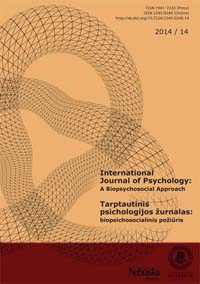Psycho-educational intervention for adolescents
Psichoedukacinės intervencinės programos paaugliams
Author(s): Tija Kriščiūnaitė, Roy Max KernSubject(s): Psychology
Published by: Vytauto Didžiojo Universitetas
Keywords: Adolescence; Intervention; Programs; Positive psychology; Individual Psychology; Paauglystė; Intervencinės programos; Pozityvioji psichologija; Individualioji psichologija
Summary/Abstract: Background. Adolescence is considered as a period of difficulties and chal¬lenges. It is the period of life of many changes. It may cause stress for adolescents, which in turn may have negative impact on adolescent’s mental health and wellbeing. Psycho-educational groups for adolescents are one of the common interven¬tions to help them to cope and gain necessary life skills. Various psycho-educational group interventions and life skills programs have been developed and used to assist adolescents to cope with the challenges of life. The authors of the programs claim that they are creating new content to address the needs of youth. However, upon closer examination there are many similarities related to the constructs and inter¬ventions proposed many years ago by Alfred Adler and his followers. The aim of this article was to compare theoretical principles of Individual Psychology with the con¬structs proposed by various psycho-educational programs for adolescents but with a more intense focus on the now popular Lerner’s Positive Youth Development model. Method. A literature review was conducted to explore the similarities of the principles of Individual Psychology and contemporary psycho-educational interventions. Results and conclusions. the conclusions of analysis of the review of literature indicated that a number of the theoretical constructs of the Lerner’s Positive Youth Development model and other psycho-educational programs have been proposed many years ago by Adler and his followers. Examples of psycho-educational programs based on the principles of Individual Psychology were also reviewed. The authors propose that the theory of Individual Psychology may serve as a viable theory base for adolescent in¬tervention programs that lack a theoretical base. It is also proposed that regardless of interventions studies need to be conducted to support the efficacy of the models. Įvadas. Paauglystė dažnai yra siejama su įvairiais iššūkiais ir sunkumais. Tai laikotarpis, kuomet paaugliai susiduria su įvairiais pokyčiais, kurie sukelia stresą, o tai gali neigiamai paveikti jų psichinę sveikatą ir gerovę. Psichoedukacinės grupės paaugliams yra vienas iš būdų, galinčių padėti įveikti su pokyčiais susijusius sunkumus ir įgyti gyvenimo įgūdžių. Egzistuoja daugybė įvairių gyvenimo įgūdžių ugdymo programų, skirtų padėti paaugliams įveikti kylančius gyvenimo iššūkius. Šių programų kūrėjai tvirtina, kad jos yra paremtos naujais ir šiuolaikiškais metodais, atitinkančiais paauglių poreikius. Tačiau pažvelgus atidžiau galima pastebėti daugybę panašumų, susijusių su Individualiosios Psichologijos konstruktais, kurie A. Adlerio teorijoje egzistavo jau prieš daugelį metų. Tyrimo tikslas. Šios literatūros apžvalgos tikslas yra palyginti Individualiosios Psichologijos principus su daugelyje psichoedukacinėse programose paaugliams naudojamais konstruktais, skiriant ypatingą dėmesį šiandien vis populiarėjančiam Lernerio pozityvios jaunimo raidos modeliui.
Journal: Tarptautinis psichologijos žurnalas: biopsichosocialinis požiūris
- Issue Year: 2014
- Issue No: 14
- Page Range: 29-50
- Page Count: 21
- Language: English

